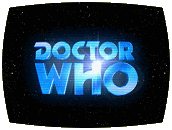 Before he is executed by the Daleks for crimes against them, the Master asks that his remains be given to the Doctor for transport to Gallifrey. En route in the Doctor’s TARDIS, the Master’s remains break free of their container, still pulsating with malevolent life. The Master sabotages the TARDIS, forcing an emergency landing in San Francisco on December 30, 1999. The moment he steps out of the TARDIS, the Doctor is caught in the middle of a gang shooting. One young survivor of the shootout, Chang Lee, calls an ambulance for the Doctor, unwittingly providing an escape for the Master as well. Cardiologist Grace Holloway ignores the X-rays which show the Doctor’s two hearts and tries to operate on him. The operation and the anasthetics end the Doctor’s seventh life. The Doctor regenerates in the morgue as the Master takes over the body of a paramedic. Grace resigns after losing her patient, but the newly reborn Doctor, suffering from amnesia, escapes the hospital and follows her home. After convincing Grace of his alien nature and regaining his memory, the Doctor discovers that his future regenerations are the Master’s targets. Aided by Chang Lee and a hypnotized Grace, the Master captures the Doctor and tries to use the TARDIS’ Eye of Harmony to transfer the Doctor’s life energy into the paramedic’s decaying body, but opening the Eye on Earth will destroy the planet at midnight on December 31. When Chang Lee rebels against the Master’s dominance, the Master kills him and releases Grace to help him. Grace escapes and sets the TARDIS into motion, freeing Earth from danger. The Master’s scheme fails, but he kills Grace after she releases the Doctor. The Master falls into the Eye of Harmony and vanishes from existence, while the TARDIS restores Grace and Chang Lee to full health. The Doctor brings his passengers back to Earth just after the dawn of the year 2000. Grace turns down the Doctor’s offer to accompany him on his travels, and the Doctor departs in the TARDIS.
Before he is executed by the Daleks for crimes against them, the Master asks that his remains be given to the Doctor for transport to Gallifrey. En route in the Doctor’s TARDIS, the Master’s remains break free of their container, still pulsating with malevolent life. The Master sabotages the TARDIS, forcing an emergency landing in San Francisco on December 30, 1999. The moment he steps out of the TARDIS, the Doctor is caught in the middle of a gang shooting. One young survivor of the shootout, Chang Lee, calls an ambulance for the Doctor, unwittingly providing an escape for the Master as well. Cardiologist Grace Holloway ignores the X-rays which show the Doctor’s two hearts and tries to operate on him. The operation and the anasthetics end the Doctor’s seventh life. The Doctor regenerates in the morgue as the Master takes over the body of a paramedic. Grace resigns after losing her patient, but the newly reborn Doctor, suffering from amnesia, escapes the hospital and follows her home. After convincing Grace of his alien nature and regaining his memory, the Doctor discovers that his future regenerations are the Master’s targets. Aided by Chang Lee and a hypnotized Grace, the Master captures the Doctor and tries to use the TARDIS’ Eye of Harmony to transfer the Doctor’s life energy into the paramedic’s decaying body, but opening the Eye on Earth will destroy the planet at midnight on December 31. When Chang Lee rebels against the Master’s dominance, the Master kills him and releases Grace to help him. Grace escapes and sets the TARDIS into motion, freeing Earth from danger. The Master’s scheme fails, but he kills Grace after she releases the Doctor. The Master falls into the Eye of Harmony and vanishes from existence, while the TARDIS restores Grace and Chang Lee to full health. The Doctor brings his passengers back to Earth just after the dawn of the year 2000. Grace turns down the Doctor’s offer to accompany him on his travels, and the Doctor departs in the TARDIS.
written by Matthew Jacobs
directed by Geoffrey Sax
music by John Debney, John Sponsler and Louis Febre
Cast: Paul McGann (The Doctor), Eric Roberts (The Master), Daphne Ashbrook (Dr. Grace Halloway), Sylvester McCoy (The Doctor), Yee Jee Tso (Chang Lee), John Novak (Salinger), Michael David Simms (Dr. Swift), Eliza Roberts (Miranda), Gordon Tipple (The Old Master), Dave Hurtubise (Professor Wagg), Jeremy Badick (Gareth), Dolores Drake (Curtis), Catherine Lough (Wheeler), William Sasso (Pete), Joel Wirkkunen (Ted), Mi-Jung Lee (TV Anchor), Joanna Piros (TV Anchor), Bill Croft (Cop), Ron James (Motorbike Cop/Driver), Dee Jay Jackson (Security Guy), Darryl Avon (Gangster), Byron Lawson (Gangster), Paul Wu (Gangster), Johnny Mam (Gangster), Michael Ching (Chang Lee’s Friend), Dean Choe (Chang Lee’s Friend), Danny Groesclose (Driver)
LogBook entry & review by Earl Green
1996 Review: Though fandom has now had years to pick apart the return – and possibly the final television appearance – of the Time Lord, I have always liked this movie a great deal. It was noticeably different, yet still distinctly Doctor Who.
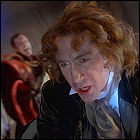 The prologue, with that “surprise involving the Daleks,” was quite interesting. They just about got the Dalek voices right, too. Again, more continuity than I expected! I didn’t get a good look at the “Old Master,” but it would seem that he got the Daleks ticked off at him something fierce. More ticked off than Frontier in Space, I’d say. There’s a New Adventure and a half in there somewhere.
The prologue, with that “surprise involving the Daleks,” was quite interesting. They just about got the Dalek voices right, too. Again, more continuity than I expected! I didn’t get a good look at the “Old Master,” but it would seem that he got the Daleks ticked off at him something fierce. More ticked off than Frontier in Space, I’d say. There’s a New Adventure and a half in there somewhere.
Anyway, from there we go to the opening titles, and I was well impressed. I didn’t think an orchestral or pseudo-orchestral treatment would work. But it did – and I liked the way they “backed into” the theme, starting with the middle section and then a segue into what most sharp-eyed listeners would recognize as the opening notes into the theme. The remainder of the music, however, seemed lacking – the same bits were used over and over again, ad nauseum, generic action-thriller music. They should’ve called Mark Ayres.
It really was wonderful to see Sylvester McCoy as the Doctor again. I had seen clips and interviews and promos, but it didn’t really hit me that Doctor Who was back until I saw McCoy at the TARDIS console again. 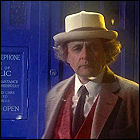 Only to see the seventh Doctor die on the operating table several minutes later. What an ignominious end to McCoy’s tenure. I suppose it could be worse – the sixth Doctor regenerated after falling off of an exer-cycle. I suppose Stammers, Howe and Walker can write the McCoy Years book now. But look at it this way – McCoy’s the first actor to have performed two regeneration scenes in which he was playing the role of the incumbent Doctor before changing!
Only to see the seventh Doctor die on the operating table several minutes later. What an ignominious end to McCoy’s tenure. I suppose it could be worse – the sixth Doctor regenerated after falling off of an exer-cycle. I suppose Stammers, Howe and Walker can write the McCoy Years book now. But look at it this way – McCoy’s the first actor to have performed two regeneration scenes in which he was playing the role of the incumbent Doctor before changing!
Only one thing struck me as out-of-place in the regeneration. What happened to the Doctor’s respiratory bypass system? Oh well; I suppose if the anasthesia had enough kick to affect regeneration, there are other bits of Time Lord physiology it could have overcome as well.
Which brings us to the half-human bit. Apparently, at least with regards to Philip Segal’s vision of Doctor Who, the half-human concept is definitive. I know this pisses a lot of people off, but it’s not entirely irreconcilible. In fact, looking at the barrage of secrets that the seventh Doctor seemed to be keeping a lid on – such as in Silver Nemesis, Survival, Remembrance of the Daleks, and so on – the half-human factor could well be it. Other factors to consider: the half-human element 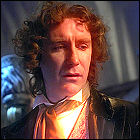 could’ve been the source of considerable scandal on Gallifrey, possibly resulting in the Doctor’s hasty departure with Susan under his wing. This is an intriguing possibility to keep in mind when you remember that the Doctor did take Leela and Nyssa to Gallifrey, but could not take Sarah Jane. Humans, one gets the impression, are personae non grata in the world of the Time Lords. Human blood in the Doctor’s veins also explains away the frequency of his visits and exploits on Earth (though in reality, of course, it’s a requirement to keep down the huge production costs for offworld stories).
could’ve been the source of considerable scandal on Gallifrey, possibly resulting in the Doctor’s hasty departure with Susan under his wing. This is an intriguing possibility to keep in mind when you remember that the Doctor did take Leela and Nyssa to Gallifrey, but could not take Sarah Jane. Humans, one gets the impression, are personae non grata in the world of the Time Lords. Human blood in the Doctor’s veins also explains away the frequency of his visits and exploits on Earth (though in reality, of course, it’s a requirement to keep down the huge production costs for offworld stories).
Retroactive continuity? Yes, it is. But Doctor Who, with its convoluted history that now officially spans 33 years – hopefully with more to come – is one big exercise in retroactive continuity. I suppose we could well have a situation with Doctor Who now that existed within Blake’s 7 fandom in the past – those who refused to include the fourth series in their concept of the show because the ending just didn’t suit them. That’s fine. Nobody’s forcing anyone to watch this. You’d think fandom would be a bit more grateful.
Remember, people, the Doctor was not identified as a Time Lord until 1969’s The War Games. It was implied, as early as Unearthly Child, that the Doctor was not human. But then the show has never been entirely consistent. If this minor detail prevents enough people from favoring the show that Doctor Who is never produced again, I blame the legions of Star Trek and even Babylon 5 fans – though I also enjoy those series as well – who have come to demand the rigid strictures of binding backstories, for forgetting how to be flexible.
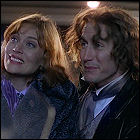 Anyway, I digress. It was good to see McGann get on his feet and start doing things Time Lordly. Grace was a very likeable companion – I thought she most resembled Liz Shaw in her scientific know-how, though she had a much better sense of humor. My one peeve with Grace came to me during the second viewing – in her first scenes, she seemed terribly arrogant. There’s a dying man on an operating table in front of her…and she wants to be picky about which opera CD she’s listening to, and then looks up for a moment as if awaiting inspiration? Remind me not to get shot in San Francisco in 1999. The laughs were a welcome element in the show, even the little in-jokes; I doubt anybody missed The Scarf, and Chang Lee correctly guessed the Doctor’s “nom de plume.”
Anyway, I digress. It was good to see McGann get on his feet and start doing things Time Lordly. Grace was a very likeable companion – I thought she most resembled Liz Shaw in her scientific know-how, though she had a much better sense of humor. My one peeve with Grace came to me during the second viewing – in her first scenes, she seemed terribly arrogant. There’s a dying man on an operating table in front of her…and she wants to be picky about which opera CD she’s listening to, and then looks up for a moment as if awaiting inspiration? Remind me not to get shot in San Francisco in 1999. The laughs were a welcome element in the show, even the little in-jokes; I doubt anybody missed The Scarf, and Chang Lee correctly guessed the Doctor’s “nom de plume.”
The rest of the show went really well. I think I could handle more of McGann as the Doctor. The eighth Doctor seemed like a mix of Pertwee’s class and protective attitudes toward humanity and Davison’s youthful enthusiasm and infinite patience.
I liked the new TARDIS interior – quite different from what we’re used to, but very neat all the same. So, nitpickers, does the new ancient wooden, Jules Verne-inspired interior of the TARDIS validate The Invasion of Time’s Victorian brickwork and lattice-door elevators? What was different was the opening monologue and the numerous occurences of seeing things from the Doctor’s own point of view, something that seems very strange after 30+ years of the Doctor being, as Barry Letts put it, “the other.”
Eric Roberts’ Master was great. Even though TV Guide and Entertainment Weekly labeled his performance as campy, he was much easier to take seriously than Anthony Ainley was half the time. Not so much to do with the performance than with the lines. A favorite example – Chang Lee: “Awesome!” The Master: “Isn’t it?”
Little details – it sure seemed to take the Doctor a few years and a couple of regenerations before he rebuilt his sonic screwdriver! And one wonders why he keeps gold dust around in little bags? For special occasions involving Cybermen, perhaps? And it was kinda neat to hear the Cloister Bell ringing again. The Doctor’s seeming foreknowledge of everyone’s lives and so forth is not something we’ve seen previously, but it was a cute touch.
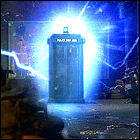 Hopes for a series or even a second movie were squelched first on May 21st, 1996 when Fox announced its fall lineup for 1996 and Doctor Who was nowhere to be seen. Two days later, in a post-mortem of the May 1996 ratings sweeps sent to all of its affiliate stations, Fox quietly announced that Doctor Who – in the network’s opinion – had been a ratings disappointment. It fared the worst of any of the two-hour movies aired during May 1996, and didn’t do much better when held up against the ratings for all other Fox programming, including sitcoms, a Sunday morning news show and weekday morning cartoons. Not many people in the major population centers of America noticed the Doctor’s return, it seems.
Hopes for a series or even a second movie were squelched first on May 21st, 1996 when Fox announced its fall lineup for 1996 and Doctor Who was nowhere to be seen. Two days later, in a post-mortem of the May 1996 ratings sweeps sent to all of its affiliate stations, Fox quietly announced that Doctor Who – in the network’s opinion – had been a ratings disappointment. It fared the worst of any of the two-hour movies aired during May 1996, and didn’t do much better when held up against the ratings for all other Fox programming, including sitcoms, a Sunday morning news show and weekday morning cartoons. Not many people in the major population centers of America noticed the Doctor’s return, it seems.
Could it be that the reason Doctor Who hasn’t been on TV and hasn’t been brought back until now is because even at its most allegedly violent and horrific, it’s simply too innocent for today’s viewing audience here or in the U.K.?
Also, in the intervening years, fandom has become obsessed with trying to tie up the show’s loose ends, and/or straightening out the show’s continuity. I know a lot of people got all overwrought about the half-human element, the Daleks holding a trial instead of exterminating the Master on sight, the look of the TARDIS, etc. etc., not fitting in with their world-view of what 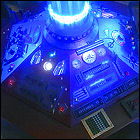 Doctor Who is. You’d think a little more gratitude would be in order – I wonder if the hacked-off portion of the fan audience would be acting like the bunch of spoiled brats that they are if this movie had been made and shown in 1990 or 1991. But the very technical nature of the sci-fi TV that has reigned supreme in the absence of the Doctor – witness the various Trek spinoffs that reached their height between 1989 and 1996, and Babylon 5, among others – has spoiled a lot of people into thinking they should expect a neat, tidy, self-explanatory fictional universe, something Doctor Who has never exactly had.
Doctor Who is. You’d think a little more gratitude would be in order – I wonder if the hacked-off portion of the fan audience would be acting like the bunch of spoiled brats that they are if this movie had been made and shown in 1990 or 1991. But the very technical nature of the sci-fi TV that has reigned supreme in the absence of the Doctor – witness the various Trek spinoffs that reached their height between 1989 and 1996, and Babylon 5, among others – has spoiled a lot of people into thinking they should expect a neat, tidy, self-explanatory fictional universe, something Doctor Who has never exactly had.
To make a somewhat silly fictional parallel, I compare this situation to the 1989 three-parter Ghost Light, where Light – i.e. fandom? – had slept for years, and when it awoke to find that things had changed in the natural course of progress, it couldn’t stand the fact that “its world” had disappeared forever. Have fandom’s arteries hardened so much that they cannot accept a new entry in their favorite show? Why?
Something extraordinary will have to happen for the Doctor to return to television now.
